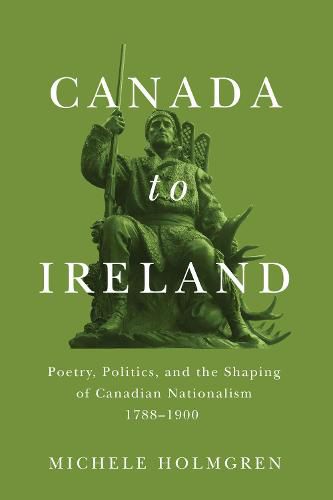Readings Newsletter
Become a Readings Member to make your shopping experience even easier.
Sign in or sign up for free!
You’re not far away from qualifying for FREE standard shipping within Australia
You’ve qualified for FREE standard shipping within Australia
The cart is loading…






This title is printed to order. This book may have been self-published. If so, we cannot guarantee the quality of the content. In the main most books will have gone through the editing process however some may not. We therefore suggest that you be aware of this before ordering this book. If in doubt check either the author or publisher’s details as we are unable to accept any returns unless they are faulty. Please contact us if you have any questions.
In the eighteenth and nineteenth centuries, Irish writers played a key role in transatlantic cultural conversations - among Canada, Britain, France, America, and Indigenous nations - that shaped Canadian nationalism. Nationalism in Ireland was likewise influenced by the literary works of Irish migrants and visitors to Canada.
Canada to Ireland explores the poetry and prose of twelve Irish writers and nationalists in Canada between 1788 and 1900, including Thomas Moore, Adam Kidd, Lord Edward Fitzgerald, Thomas D'Arcy McGee, James McCarroll, Nicholas Flood Davin, and Isabella Valancy Crawford. Many of these writers were involved in Irish political causes, including those of the Patriots, the United Irish, Emancipation, Repeal, and Young Ireland, and their work explores the similar ways in which nationalists in Ireland and Indigenous and settler communities in Canada retained their cultural identities and sought autonomy from Britain. Initially writing for an audience in Ireland, they highlighted features of the landscape and culture that they regarded as distinctively Canadian and that were later invoked as powerful unifying symbols by Canadian nationalists. Michele Holmgren shows how these Irish writers and movements are essential to understanding the tenor of early Canadian literary nationalism and political debates concerning Confederation, imperial unity, and western expansion.
Canada to Ireland convincingly demonstrates that Canadian cultural nationalism left its mark on both countries. Contemporary decolonization movements in Canada and current cultural exchanges between Ireland and Indigenous peoples make this a timely and relevant study.
$9.00 standard shipping within Australia
FREE standard shipping within Australia for orders over $100.00
Express & International shipping calculated at checkout
This title is printed to order. This book may have been self-published. If so, we cannot guarantee the quality of the content. In the main most books will have gone through the editing process however some may not. We therefore suggest that you be aware of this before ordering this book. If in doubt check either the author or publisher’s details as we are unable to accept any returns unless they are faulty. Please contact us if you have any questions.
In the eighteenth and nineteenth centuries, Irish writers played a key role in transatlantic cultural conversations - among Canada, Britain, France, America, and Indigenous nations - that shaped Canadian nationalism. Nationalism in Ireland was likewise influenced by the literary works of Irish migrants and visitors to Canada.
Canada to Ireland explores the poetry and prose of twelve Irish writers and nationalists in Canada between 1788 and 1900, including Thomas Moore, Adam Kidd, Lord Edward Fitzgerald, Thomas D'Arcy McGee, James McCarroll, Nicholas Flood Davin, and Isabella Valancy Crawford. Many of these writers were involved in Irish political causes, including those of the Patriots, the United Irish, Emancipation, Repeal, and Young Ireland, and their work explores the similar ways in which nationalists in Ireland and Indigenous and settler communities in Canada retained their cultural identities and sought autonomy from Britain. Initially writing for an audience in Ireland, they highlighted features of the landscape and culture that they regarded as distinctively Canadian and that were later invoked as powerful unifying symbols by Canadian nationalists. Michele Holmgren shows how these Irish writers and movements are essential to understanding the tenor of early Canadian literary nationalism and political debates concerning Confederation, imperial unity, and western expansion.
Canada to Ireland convincingly demonstrates that Canadian cultural nationalism left its mark on both countries. Contemporary decolonization movements in Canada and current cultural exchanges between Ireland and Indigenous peoples make this a timely and relevant study.